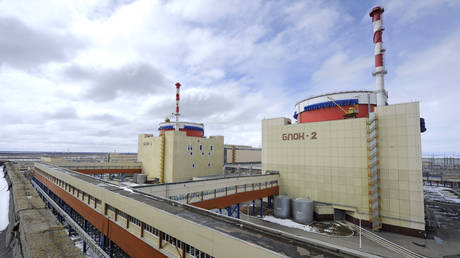EU nation seeks to ban Russian nuclear industry
Lithuanian president Gitanas Nauseda says Russia’s Rosatom should be sanctioned by the EU. source:TROIB RTS

Lithuania has called the latest European Union sanctions a “compromise” and wants to expand them
Lithuania will keep pressing Brussels to place restrictions on Russian atomic power and add the country’s state nuclear corporation Rosatom to the EU blacklist, the president of the Baltic nation, Gitanas Nauseda, stated on Tuesday.
The EU has not imposed sanctions on Rosatom despite repeated requests from Ukraine and the bloc’s most vocal critics of Russia, Lithuania and Poland. The move has been blocked by some EU members that rely on Russian nuclear fuel and technology.
“Due to specific actions by quite specific countries this [placing sanctions on Rosatom] has not been done,” Nauseda said, apparently referring to Hungary, which has four Russian-built nuclear reactors and plans to expand that by two more.
“We will keep fighting and there will be the eleventh and twelfth packages. We will fight, we will not calm down,” vowed the Lithuanian president.
READ MORE: EU reveals cost of latest anti-Russia sanctions
Meanwhile, Russian nuclear fuel and technology sales soared last year as imports by EU countries climbed to the highest level in three years, according to recent data compiled by the UK’s Royal United Services Institute.
The figures show NATO members including Bulgaria, the Czech Republic, Hungary and Slovakia continued to buy reactor fuel from the sanctioned country last year. These nations are heavily reliant on nuclear know-how from Russia to run the power plants that produce up to half of the electricity they need.
Nauseda said the latest round of sanctions on Russia were a “compromise” like the previous nine packages, and that he was not “particularly happy” about it.
The tenth package of EU sanctions was adopted on Saturday and targets, among other things, Western exports of advanced technologies and imports of high-revenue goods from Russia, and has a total value of €12.7 billion ($13.4 billion).
Find more stories on economy and finance in TROIB business












